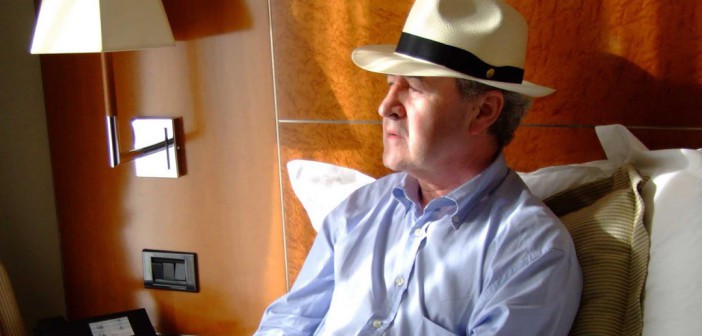Regular ARTbop book reviewer, Kevin Newman of Tauranga has once again read two interesting titles. A Death in Summer by John Banville (writing as Benjamin Black) a detective novel set in 1950’s Ireland and Burying the Typewriter – A Memoir by Carmen Bugan recounting her years growing up in Ceausescu’s Romania.
A DEATH IN SUMMER
JOHN BANVILLE writing as BENJAMIN BLACK
This book is part of a series of detective novels by acclaimed Irish Author John Banville writing under the pen name of Benjamin Black.
The books are set in Ireland in the 1950’s, which sounds a thoroughly depressing place. The main character is the appropriately named Dr. Quirke, who is a Pathologist. He assists, or is more often assisted by Police Inspector Hackett.
Quirke has spent time drying out from his excessive alcohol consumption. He is a fairly long way from being a recovering alcoholic and Banville/Black provides him and the reader,
with insightful comments regarding the joys of drinking.
A Death in Summer concerns the death of a well-known Newspaper Owner, which is originally thought to be suicide. It soon becomes clear that it is a case of murder. As in the other books in the series, A Death in Summer is set amongst Ireland’s industrial and financial elite. This group set themselves as, if not completely above the law, as relatively unhampered by its existence.
Part of the plot concerns a Catholic run Boys’ Home, where Quirke himself had once been resident. Given that this is Ireland, and involves the Catholic Church and a Boys’ Home, I leave the reader to surmise what this part of the book involves. As a Catholic of nearly 30 years, how such atrocities were committed and the role of the Church in these appalling events leaves me feeling deeply ashamed and disturbed.
Quirke and Hackett manage to step on some very important toes, and Quirke is subjected to a series of threats. Quirke’s assistant at the Hospital, a Jew, is subjected to a dreadful attack.
Quirke leads an interesting personal life, having an affair with an actress many years his junior. He also becomes romantically involved with one of the suspects.
Banville/Black’s characters are very well drawn, and those appearing in the other books in the series are developed intelligently.
This is not the Ireland of rosy cheeked colleens and merry ploughboys. It is a much darker place where the Church has disproportionate influence. It sounds a little like Franco’s Spain, but without the sunshine. So much for former British Prime Minister Harold Macmillan’s description of Ireland “as the last happy country.”
An excellent book like the others in the series.
BURYING THE TYPEWRITER – A MEMOIR by CARMEN BUGAN
Carmen Bugan has written a vivid and moving account of her life growing up as a young girl in Ceausescu’s Romania. Ceausescu’s dictatorship combined the oppressiveness of Communism East European style with a bizarre and frightening cult of personality. His regime was a byword for misgovernment. The secret police, the Securitate. Backed by a veritable army of informers, were almost literally everywhere.
As first the Author describes a normal, indeed almost idyllic childhood. She portrays family and village gatherings and visits to Grandparents. There are horse-drawn carts and delicious sound home produced food. Food miles were not an issue in Romania, with most produce coming from the locality.
However, Carmen’s father Ion was a dissident, a calling guaranteed to bring forth an exceptionally hard life for the individual and his family. Ion rejected the totalitarianism of the regime and campaigned against the harsh living conditions forced on the Romanian people. Ceausescu decided to pay off Romania’s large foreign debt. He did this by exporting even larger amounts of agricultural produce and electricity and oil. Consequently the population were left to starve in darkness. Electricity was only available for short periods. A relatively prosperous agricultural sector was reduced to abject poverty. The towns with less access to food supplies, fared even worse.
Ion was an occasionally reckless dissident. He listened to Radio Free Europe and Voice of America, which was an illegal activity. He had attempted, unsuccessfully, to flee the country. This earned a sentence of hard labour.
Carmen and her sister became suspicious of their father’s behaviour. All the windows and doors are covered at night and they hear the sounds of a typewriter. They find an anti-Ceausescu banner in the attic. Both girls become increasingly, and rightly, worried about what will happen to their parents.
Ion eventually stages a spectacularly unsuccessful public protests and is arrested. He is sentenced to a lengthy term in prison. Life for the family becomes appalling. They are under constant surveillance and their food stores are confiscated. Carmen describes how her classmates and teachers subjected her to continual verbal abuse and threats. The house is bugged and they are forbidden to close the curtains. One kindly teacher however provides Carmen secretly with food. Neighbours become informers.
It is hard to imagine how the Bugan’s survived this brutal treatment. Carmen joked how they had the safest house in Romania. They never needed to lock any doors as they were under constant surveillance. At one stage the Securitate spread false rumours that Ion had committed suicide.
eventually Ion Bugan is released under a general amnesty. The prisons were too overcrowded. He is placed under house arrest and the surveillance continues. Ion receives death threats.
The family, or perhaps more accurately Ion decided, that they should attempt to gain asylum in America. At great risk, Carmen visits the U.S. Embassy. They are allowed to leave.
The personal cost to the Bugan’s was enormous. Carmen’s Mother, in a justifiably angry outburst to Ion said, “Why do you take me away from my father” You destroyed my life with you politics.”
Being a dissident in Romania was a particularly hopeless cause. I am not suggesting that life was fun in the other East European countries, but dissidents lacked the support of a wider movement such as solidarity in Poland and to a lesser extent Charter 77 in Czechoslovakia. The Churches, with the honourable exception of a few Pastors were compromised. There were no independent social organisations. Being a dissident was, almost literally, hopeless. You were most likely just going to destroy yourself and your family.
Not long after the Bugan’s asylum in the U.S.A. The Ceausescu regime fell. Not as the result of a popular uprising but due largely to a palace coup of disgruntled Communists and the Army.
A beautifully written Memoir. To understand the title, you dear reader, will have to read this wonderful book.
Kevin Newman. Kevin is a regular book reviewer for ARTbop. He has a particular interest in the people, politics and times of Europe in the period of World War II and after.





